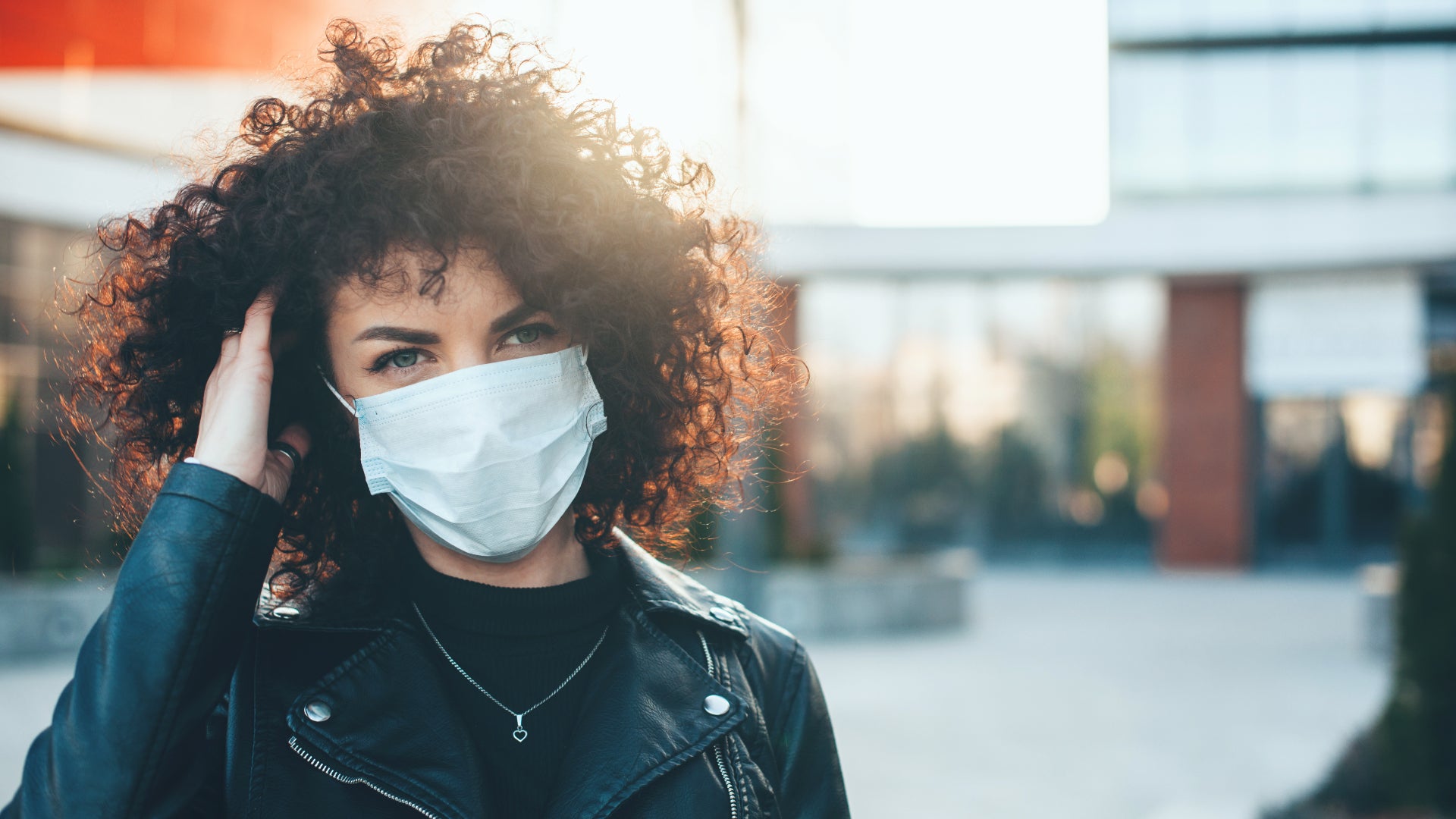
Maskne: What It Is And How To Deal With It
Are you suffering with flare-ups around your chin and cheeks? Chances are they’re all down to wearing a face mask for prolonged periods of time. The good news is we can help with that.
The world in which we currently live has created so many challenges to our health it’s hard to keep up. But it doesn’t look like Covid-19 is going away any time soon and the impacts of this extremely complicated virus are very real. We’re not qualified to go too deep into this horrible disease, but what we can do is help with one issue that’s become a real struggle for many people: acne on the cheeks, chin and jawline that's caused by the constant mask-wearing we're faced with for the foreseeable future, otherwise known as maskne.
What Is Maskne?
Maskne is not a new phenomenon. Any healthcare worker can tell you that wearing PPE (personal protective equipment) 24/7 can cause nasty reactions on the skin. It’s just that you and we are not used to it and so, with the help of Instagram and Twitter, we’ve given it a new name;)
The real medical term for maskne, however, is acne mechanica.
Acne mechanica is a term given to localized acne spots caused by pressure, friction and/or continued rubbing against the skin. This stress irritates the hair follicles and results in a build-up of oil, dirt, sweat and bacteria. And there are no prizes for guessing what all those nasties end up doing to the skin. Breakouts galore.
As well as healthcare workers, footballers often feel the brunt of acne mechanica across the tops of their backs and shoulders thanks to constantly wearing shoulder pads. Truck drivers may also suffer with it where their backs rub against their seats. And now, the nation is feeling their pain thanks to the necessity of wearing a face mask in public to help reduce the spread of Covid-19.
But friction isn’t the only cause of maskne. All that warm, moist breath creates a delicious environment for bacteria to breed on your skin. And when you couple this with the synthetic materials most masks are made of (yes, we’re talking to you nylon, rayon, polyester and acrylic)? Well, your skin stands literally no chance of fighting maskne.
Actually, we take that back, because with a little know-how and some top notch skincare swag, you can totally win the maskne war. Here’s how…
5 Ways To Prevent & Treat Maskne
1. Keep Your Skin Clean And Moisturized
According to the American Academy of Dermatology (AAD), the number one way to prevent mask-related skin irritations is to cleanse and moisturize your skin well and often.
Keep some fragrance-free, biodegradable cleansing wipes in your purse for quick, on-the-go cleansing, and thoroughly wash your skin both morning and night with a gentle, non-pore clogging cleanser. We love our Charcoal Face Wash which contains activated coconut charcoal to absorb oil and balance your complexion, plus soothing aloe and antibacterial lavender.
And word on the street is that you folks love it, too…
“I noticed a big difference after using this for three days,” explains TruSkin customer, Liz Brown.
“I had started breaking out in my mask area around my chin and jaw line. I’m 41 and was breaking out like a teenager. <But this> works great! I plan on keeping using this and even made a Facebook post telling all my family and friends,” she adds.
Thanks Liz, we're so glad you love it as much as we do.
For an effective clean, always wash your hands first, then massage the cleanser over your damp face and neck using the pads of your fingers to gently work it all over. Rinse thoroughly and gently pat dry with a clean towel.
After cleansing, whatever other skincare serums and treatments you like to use and however oily your skin is, never forget to moisturize as this will not only strengthen your natural protective barrier, but will help reduce friction and irritation from your mask. Go for light, but effective moisturizers that contain humectants and emollients rather than heavy occlusive ingredients like butters and oils.
2. Be Mask Savvy
Having the right kind of mask to best protect yourself from Covid-19 is obviously the most important thing here and experts agree that those with at least two tightly woven layers of fabric are the most effective.
To help reduce maskne, swap out masks made from synthetic fabric for 100 percent cotton. Cotton is lightweight, washable, breathable and allows moisture and heat to escape way more easily than its synthetic counterparts, so make sure you stock up on a few so you’re never without. Also, ensure your mask fits snugly, but comfortably, as this will offer further protection while reducing irritation at the same time.
Another important piece of mask advice is to clean yours after each use and especially after exercising. This will help get rid of saliva, nasal secretions, dead skin cells and microbes from hanging around in your mask and doing their dirty deeds. Pop yours in the laundry regularly – using a fragrance-free, hypoallergenic detergent – or hand wash it after every use using mild soap or shampoo.
3. Skip The Heavy Makeup
In an ideal sitch, we’d say go makeup-free whenever you need to wear your mask. But we know many of you would rather eat your own toenail clippings than venture into the outside world with no makeup on. Caking your skin in heavy foundation, however, will just exacerbate flare-ups, so try to go light and oil-free all the way.
Tinted moisturizers are great if you like wearing a light dose of color to even out your skin tone, but if your skin craves more coverage, try mineral foundations. These are generally non-pore clogging so are perfect for oily or problematic skin types. They also protect your skin from the sun as an added bonus. Woot.
4. Go Easy With Active Skincare Ingredients
When your skin is irritated and sensitized its barrier function has been compromised. This means strong, active ingredients such as retinol, antioxidants, AHAs and BHAs could cause even further problems to the surface of your skin including redness, itching, dryness and peeling.
To keep irritations to a minimum, curb your actives for a short while by applying them on a less frequent basis (perhaps every two or three days, rather than daily) or choosing gentler formulations that contain lower concentrations of active ingredients.
Also, if your skin is really suffering, the AAD recommends sticking with what you know rather than introducing new, potentially irritating products into your daily routine.
“To reduce skin problems, avoid trying harsh products such as chemical peels, exfoliants or retinoids for the first time,” recommends board-certified dermatologist Daniela Kroshinsky, MD, MPH, FAAD.
5. Remember, No Touching
Avoid transferring even more bacteria, dirt and oil to your skin by keeping your hands well away from your face. Yeah, yeah, we know your hands have probably never been so clean, but still, they have no place touching your skin. End of.
Finally, if you’ve tried everything but your skin is still suffering, please don’t hesitate to contact a skincare professional for advice. It may be that your breakouts are being caused by something other than your face mask, but an expert will be able to diagnose this far better than you.









